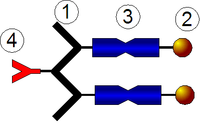
Photo from wikipedia
Magnetic nanoparticles (MNPs) are interesting for various applications in medicine. If administered to a biological system like the human body, a so-called biomolecule corona is formed on the surface of… Click to show full abstract
Magnetic nanoparticles (MNPs) are interesting for various applications in medicine. If administered to a biological system like the human body, a so-called biomolecule corona is formed on the surface of the particles, which highly determines the biological fate of the particles. To elucidate whether a preconditioning of the MNPs by incubation with biomolecules influences biocompatibility and bioavailability, the formation of such a corona was investigated in more detail. For this, the influence of particle characteristics, e.g., surface charge, as well as various incubation parameters on the resulting corona was investigated. It was found that the biomolecule corona is formed immediately after bringing together the particles with the biomolecule source. By variation of the biomolecule content of the incubation medium, the size of the corona can be modulated. Regarding the interaction of the nanoparticles with cells, it was shown that the presence of a biomolecule corona reduces the interaction and that a more pronounced biomolecule corona leads to a reduced uptake of the magnetic nanohybrids into the cells. Cell viability tests confirmed biocompatibility of the biomolecule-coated particles. A more pronounced corona promotes a higher cell viability. By using a shell-less hen’s egg model, no or reduced adverse effects of all biomolecule-coated MNP for this in vivo test were found. Resulting from these investigations, we were able to demonstrate that our newly developed nanohybrids significantly reduce in vivo toxicity compared to uncoated MNPs.
Journal Title: Physical sciences reviews
Year Published: 2020
Link to full text (if available)
Share on Social Media: Sign Up to like & get
recommendations!